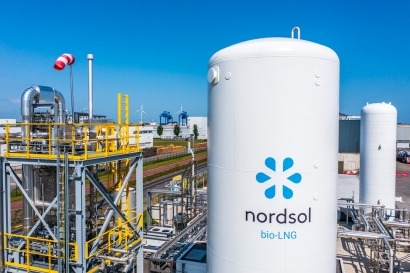
The new plant will serve an industrial facility in the olive oil production sector, utilizing their organic waste to create clean, renewable energy. This groundbreaking facility, poised to commence operations in early 2025, marks a significant milestone in sustainable energy development for the region and the industry at large.
Bio‑LNG: Fueling the Future
Bio-LNG, or liquefied biomethane, is a renewable fuel that is chemically identical to conventional LNG. Produced through the liquefaction of biogas, bio-LNG serves as a clean alternative to fossil fuels, capable of powering long-distance transport as well as high-temperature industrial processes without the carbon footprint associated with fossil energy sources. Because it makes use of existing LNG infrastructure and technology, bio-LNG is playing an important role in the reduction of GHG emissions, now.
From Organic Waste to Energy
To maximize the value of the organic residues from olive oil production, the biogas plant and the bio-LNG installation are co-located. The facility's projected output is set to reach 10 tons of bio-LNG and 21 tons of biogenic liquefied CO2 daily from 1100 nm³/h of biogas, primarily sourced from olive waste water. The liquefied state allows for efficient transportation of the biomethane to a gasification unit, linking it directly into the natural gas network. From this entry point, this biomethane will be utilized to decarbonize high-temperature / high-pressure industrial processes.
Innovative Technology and Strategic Integration
The bio-LNG production process involves upgrading biogas into biomethane using Prodeval's advanced VALOPUR® membrane technology. This biomethane is then liquefied to bio-LNG using Nordsol's innovative, energy efficient technology, providing a high energy density, sustainable alternative to fossil fuels. The biogenic CO2 captured during the process will be liquefied using Prodeval's V'COOL® FG system, emphasizing the facility's dedication to environmental stewardship. This biogenic CO2 will be used in the food and beverage industry where it will displace CO2 from fossil resources.
To ensure peak performance and sustainability, the plant will integrate Prodeval's systems for biogas upgrading and CO2 liquefaction with Nordsol's patented technology for biomethane purification and liquefaction, which has been in operation in Amsterdam for almost three years. This process integration highlights the commitment of both companies to achieve the highest levels of energy efficiency and production reliability.
This project marks the third installation by Prodeval for a client in Portugal, reinforcing the company's commitment and expertise in the region.

